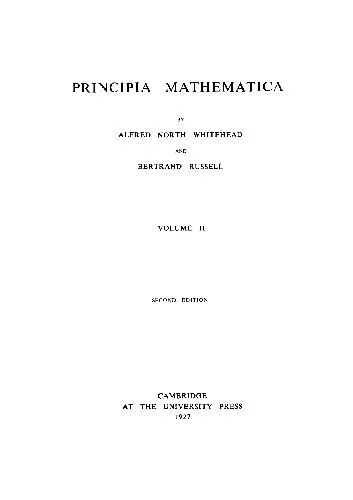Principia Mathematica
4.5
Reviews from our users

You Can Ask your questions from this book's AI after Login
Each download or ask from book AI costs 2 points. To earn more free points, please visit the Points Guide Page and complete some valuable actions.Introduction to Principia Mathematica
Principia Mathematica, authored by the renowned mathematicians Alfred North Whitehead and Bertrand Russell, is one of the most significant works in the field of mathematical logic and philosophy. This groundbreaking three-volume work, published between 1910 and 1913, intended to lay a rigorous foundation for all of mathematics. The book represents a monumental effort to elucidate and solidify the logical underpinnings of mathematics, and its impact on the fields of logic, philosophy, and mathematics is profound and enduring.
Detailed Summary of the Book
Principia Mathematica is structured to build a robust framework of logic from which all mathematical truths could be derived. The authors sought to derive most of the known truths of mathematics with a minimal set of axioms and primitive notions. The work begins with the description of a formal logical system, encompassing a theory of types and a sophisticated symbolic logic. Throughout the volumes, Whitehead and Russell focus on proving foundational theorems in mathematics, including number theory, set theory, and more. The book employs a meticulous, formal, and symbolic language to ensure precise expression of mathematical ideas, a hallmark that presents both its strength and its complexity. The famous proposition 1+1=2 is not reached until deep into the text, demonstrating the depth and rigor of the foundational work performed upfront.
Key Takeaways
- The Principia Mathematica serves as a fundamental attempt to formalize logic, establishing a connection between mathematics and logical theory.
- It introduces the theory of types, which resolves certain paradoxes in set theory, like Russell's Paradox.
- The work laid the groundwork for modern symbolic logic and influenced subsequent formulations of logic and the philosophy of mathematics.
- Despite its ambitious goal of deriving all mathematical truths from a set of axioms, Gödel's Incompleteness Theorems later showed the inherent limitations of such an undertaking.
Famous Quotes from the Book
"The logic merely indicates the order in which ideas are to be assembled, and assists in the detection of fallacies. It is in itself empty of content." - Alfred North Whitehead, Bertrand Russell
"Our work has proved that the data employed by mathematicians can be derived from logical premises by logical methods." - Alfred North Whitehead, Bertrand Russell
Why This Book Matters
Principia Mathematica matters because it represents one of the earliest and most ambitious efforts to systematically unfold the logical foundations upon which mathematics rests. Its influence permeates a wide array of academic fields, including computer science, mathematics, and philosophical logic. The methods and symbolic logic detailed in Principia Mathematica form the backbone of much of modern logical theory. Despite the eventual discovery of limitations to what can be proven within such systems, the groundwork laid by Whitehead and Russell continues to inform contemporary approaches to the foundations of mathematics and logic. By articulating concepts like the theory of types and connecting them to the broader mathematical dialogue, the book set a precedent for rigorous analytical philosophy and logical analysis, transforming how mathematical legitimacy and logical coherence are perceived.
Free Direct Download
You Can Download this book after Login
Accessing books through legal platforms and public libraries not only supports the rights of authors and publishers but also contributes to the sustainability of reading culture. Before downloading, please take a moment to consider these options.
Find this book on other platforms:
WorldCat helps you find books in libraries worldwide.
See ratings, reviews, and discussions on Goodreads.
Find and buy rare or used books on AbeBooks.
1427
بازدید4.5
امتیاز50
نظر98%
رضایتReviews:
4.5
Based on 0 users review
"کیفیت چاپ عالی بود، خیلی راضیام"
Questions & Answers
Ask questions about this book or help others by answering
No questions yet. Be the first to ask!


